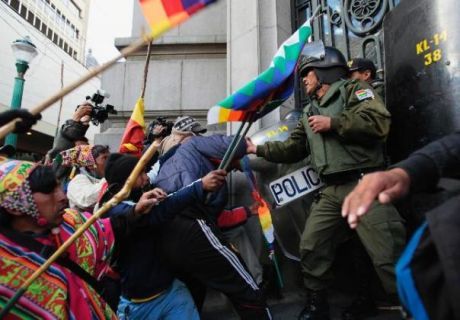News
You are here
Bolivian indigenous communities win nationalization of Canadian mine

October 5, 2012
After pressure from indigenous communities, the Bolivian government nationalized the Canadian corporation South American Silver’s mining project in Malku Khota. The Financial Post calls this the action of an “outlaw nation,” but the real outlaws are the imperial states and corporations that have been stripping wealth from Bolivia for centuries.
Malku Khota is in the department of Potosí in southern Bolivia. For 100 years, after being conquered by Spain, the mines of Potosí, through the use of forced indigenous labour, produced half of the entire world’s gold and silver. None of that wealth stayed in Potosí.
The social movements sweeping Latin America carried Evo Morales into office, and under the new constitution indigenous communities are supposed to have official control over their land and its use. But when Vancouver-based South American silver failed in its attempt to get the last three of the 46 communities in Malku Khota to sign onto a deal, 50 police officers broke into people’s homes on May 5. In response, community leaders detained two of the police, releasing them later.
The theft of resources by transnational corporations have pitted communities against each other, and on May 18 three people were injured in a confrontation between those for and against the project—which police used as pretext to arrest anti-mining leader Tata Cancio Rojas.
On June 7 indigenous people fought riot police outside the vice-president’s office—demanding Morales cancel the agreement with the Canadian subsidiary—and on June 29 anti-mining forces detained two engineers working for South American Silver. Police responded on July 7 with a “rescue” operation that shot and killed Jose Mamani, one of the anti-mining activists.
As a result of the revolt, Morales met with local indigenous leaders who were opposed to the mining project, urged the Public Ministry to carry out an investigation into the killing of Mamani, and nationalized the mine.
This is the latest nationalization won by the social movements that swept Morales into office. As the Financial Post noted, “Under Morales the country has become a world leader in this department. He nationalized Bolivia’s national gas industry in 2006, its biggest telecommunications company in 2008, its hydroelectric complex in 2010 and its leading power company in 2012”.
Section:
- Log in to post comments










